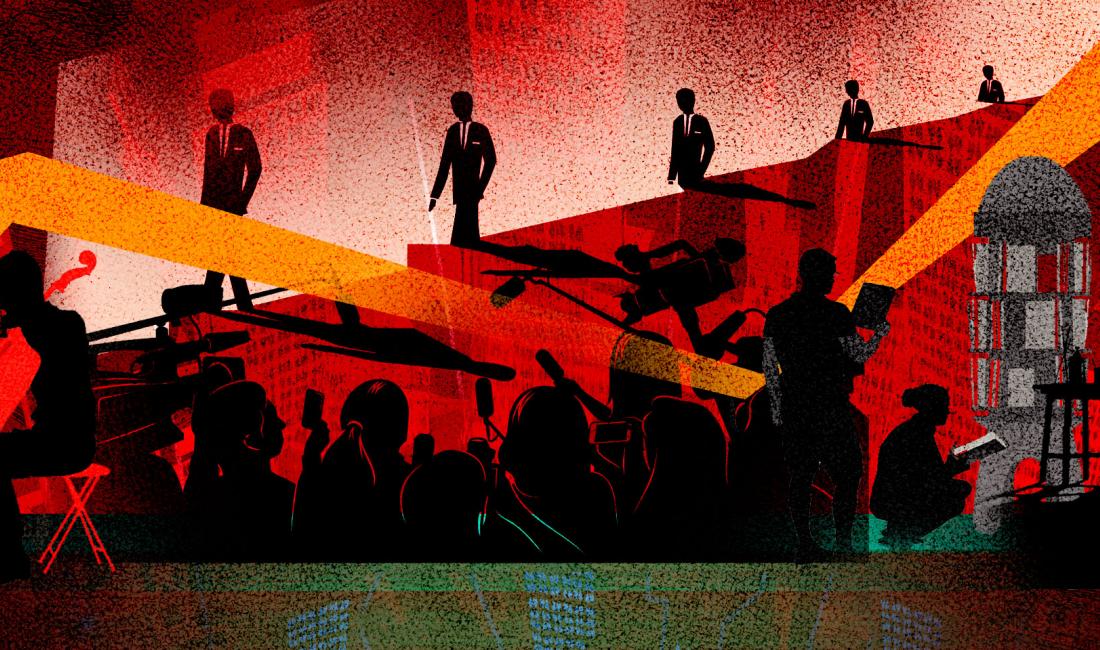Hong Kong Uses Tax Audits, Licensing, Inspections
This story and image were originally produced and published by Asia Democracy Chronicles.
Hong Kong drama performer Chan Kim-kam was preparing for a stage production last May when she was suddenly informed by her drama group that state authorities had demanded she be replaced. Otherwise, the venue booking for the show, which was scheduled for the following week, would be revoked, so she was further told.
The Leisure and Cultural Services Department, which oversees public performance venues, gave no reason for its decision and refused to comment when asked by the media.
Chan, who is also a social worker and former district councilor, remains an outspoken figure—and one of the few who is still active—in Ho’’ng Kong’s pro-democracy movement—and is one of the few still active amid a sweeping crackdown marked by mass arrests of dissidents and the dissolution of hundreds of civil society groups.
A year ago, she was arrested alongside five other activists, including now imprisoned human rights lawyer Chow Hang-tung, on charges of “seditious intention” under the Safeguarding National Security Ordinance, also known as Article 23. They were accused of posting allegedly seditious content on a Facebook page supporting Chow.
For activists like Chan, seen as national security threats for their involvement in civil society and social movements, harassment and intimidation via politicized administrative powers have become routine in Hong Kong. Virtually any regulation, procedure, or law can now be turned into a tool to silence dissent.
Tax audits as weapons
On May 21, the Hong Kong Journalists Association (HKJA) revealed that at least seven independent media outlets and 20 individuals—including journalists’ family members— had been investigated by Hong Kong’s Inland Revenue Department (IRD) over their tax records covering the past seven years.
The union reported that one journalist was asked to pay profit tax for a company they did not own and with a non-existent registration number. HKJA Chair Selina Cheng was also ordered to pay additional taxes for the 2017/18 financial year, when she was employed by a local media outlet. The IRD accused her of having “unreported” income totalling HK$400,000 ($50,964), without providing any supporting evidence.
Another local media outlet, Hong Kong Free Press, was “randomly selected” for audit and twice ordered to pay provisional tax before the investigation was concluded. The amounts were later reduced to zero after the outlet filed formal objections.
However, not all media organizations or journalists have the capacity to endure the IRD’s burdensome investigations. Apart from the time required to contest the authorities’ claims, they may need to hire lawyers or accountants to manage the process.
More concerning is the requirement to pay provisional tax at the outset of an investigation—a substantial burden for independent journalists, many of whom earn modest incomes, and media outlets that often operate with limited resources.
Civil society groups, bookstores, and private companies run by activists are similarly under close scrutiny by the authorities. AsOne, a retail shop selling local products and approved items for prisoners and which was founded by another former pro-democracy district councilor, was ordered to pay approximately HK$120,000 ($15,292) in provisional profit tax for 2024.
This suggests that the IRD estimated the company had made a profit of HK$1.5 million ($191,000). However, AsOne said it had been operating at a loss since its establishment in 2022, giving the lie to the department’s claim.
Small businesses under siege
Since the imposition of the National Security Law in 2020, Hong Kong authorities have increasingly used administrative powers to target NGOs, bookstores, and businesses associated with pro-democracy figures. These entities are frequently subjected to inspections by a range of departments, including the Fire Services Department, the Food and Environmental Hygiene Department, and the Companies Registry.
In April 2024, Mount Zero, a popular independent bookstore and venue for cultural events, was forced to cease operations following a wave of anonymous complaints and repeated official inspections.
Another bookstore, owned by still another erstwhile pro-democracy councilor, Leticia Wong, and which continues to sell politically sensitive books, was subjected to 92 instances of official action between July 2022 and June 2025.
These included inspections, patrols outside the premises, and the issuance of warning letters. It has also become common for government officers to appear at seminars, reading groups, and film screenings under the pretext of “handling complaints.”
Beyond the use of existing powers, nearly all government bureaus and departments have introduced national security provisions into their regulations and guidelines.
In late May, the Food and Environmental Hygiene Department (FEHD) issued letters to all license holders of restaurants, entertainment venues, funeral services, and other businesses, outlining new national security requirements.
One of these was a clause stating that a license can be revoked if the license holder or any “related person” engages in “offending conduct” against national security or the public interest.
Repressive regulations
With no clear definition of “offending conduct,” the move has sparked widespread concern over authorities’ sweeping powers to close businesses linked to pro-democracy supporters even without, without any need for a criminal conviction.
It is still unclear whether acts such as criticizing the government or displaying pro-democracy symbols would qualify as “offending.”
More troubling, the same clause could deter businesses from employing anyone convicted under national security laws or imprisoned for participating in social movements, since “related persons” also covers employees.
These new requirements illustrate how administrative powers are being quietly expanded to suppress dissent, bypassing formal legislative processes.
Compared to overt criminal prosecution, such tactics are more subtle, yet potentially more far-reaching, targeting individuals and organizations through financial pressure, bureaucratic obstacles, and regulatory intimidation, often without the need to go through courts.
By embedding national security clauses into everyday regulations, Hong Kong’s authorities have blurred the line between governance and political reprisal, turning once-routine administrative processes into instruments of fear and compliance.
Those who remain committed to preserving civil society in Hong Kong must now endure a prolonged and exhausting battle with an increasingly repressive bureaucracy.



